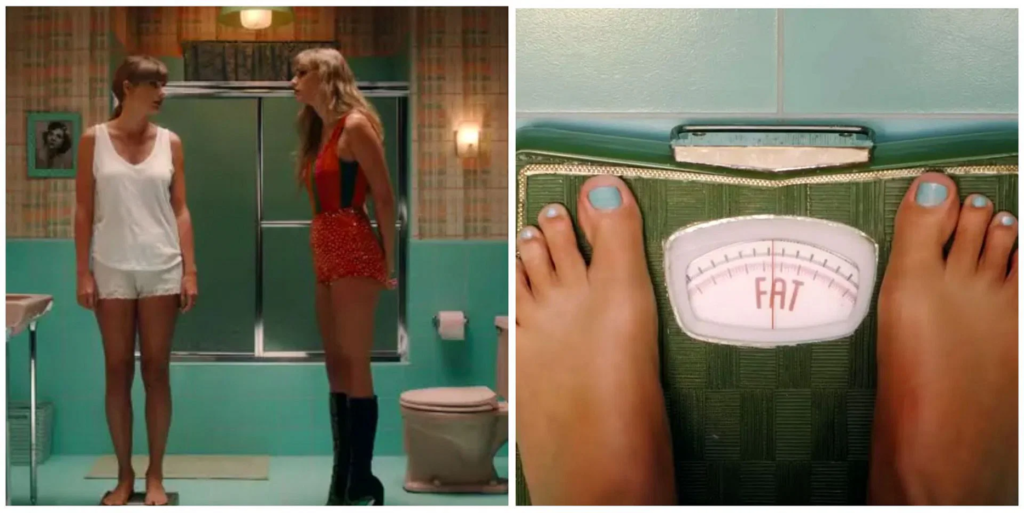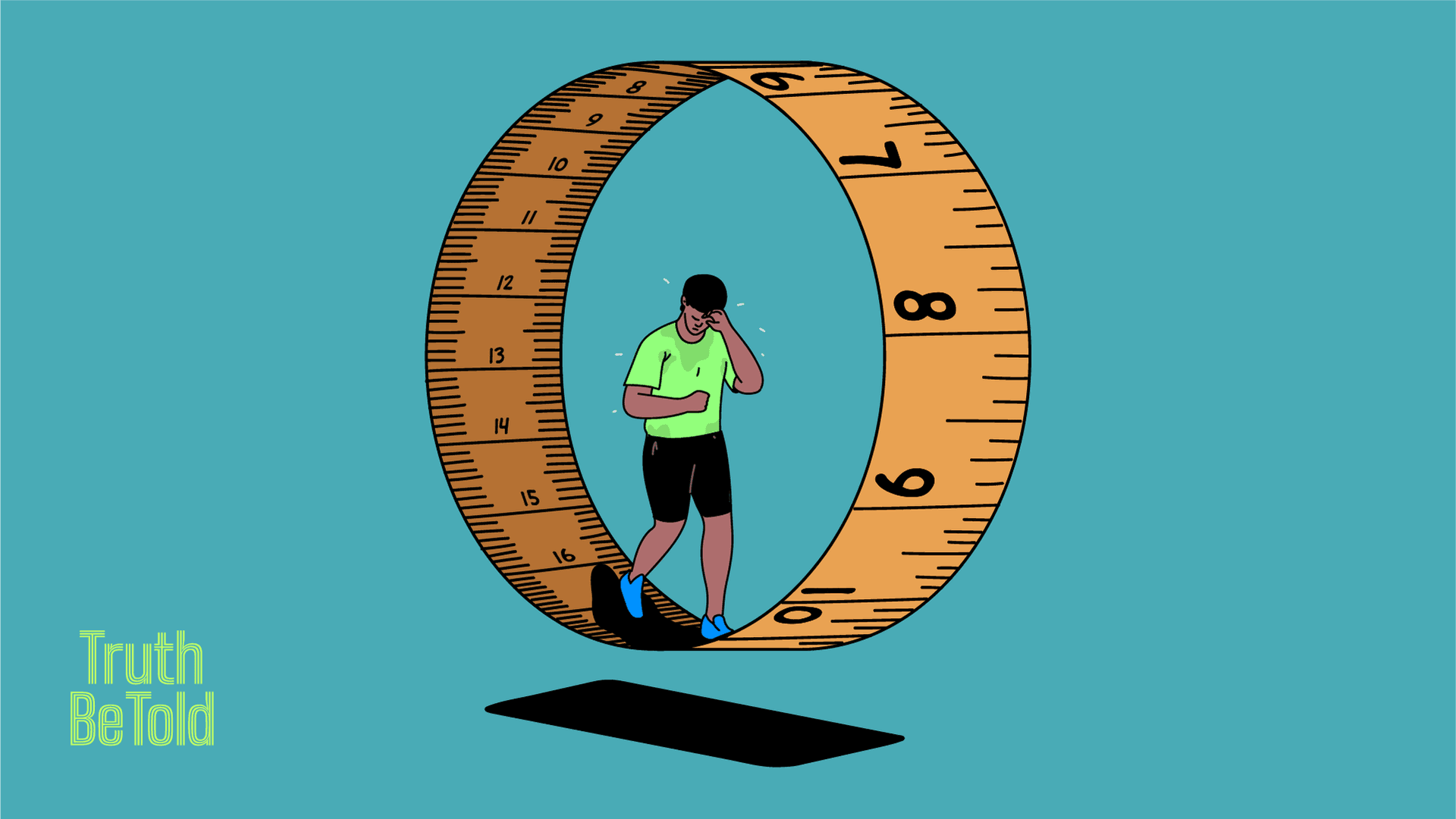Everyone has an opinion on your body. But why?
From the controversy around Taylor Swift's new video to the conversations around people's bodies.
The most trustworthy source of food and
fitness journalism in the country.
Welcome to Truth Be Told, a weekly food & fitness newsletter. New here? Read our manifesto: a note on why we exist.
In her latest studio album, Taylor Swift yet again wrote about Taylor Swift — the world is loving it, the world is hating it.
Especially the lead single, “Anti-Hero”, where the singer-songwriter is at her vulnerable best. The catchy and unapologetically honest hook of this self-hate anthem (“a guided tour throughout all the things I tend to hate about myself,” she says) is dominating reels and bios: “It’s me, hi, I’m the problem, it’s me!”

I fall into the lovers club. Swift has often used art as a medium to reveal her fears and anxieties. With the bleeding heart lyrics of this song, she reinforces a crucial point: many of our insecurities are universal, and many are about how we perceive ourselves. We are our anti-heroes, and that makes things worse.
The haters club was offended by one scene from the music video where Swift and her anti-hero alter ego are in the bathroom. The real self stands on the weighing scale as the doppelganger looks at the reading. The scale says “FAT”. The anti-hero disapproves. The real her is sad.

The use of the word “FAT” caused outrage. It insensitively promotes fatphobia, said some. Shira Rose, a New York-based eating disorder therapist, tweeted:
Taylor Swift’s music video, where she looks down at the scale where it says “fat,” is a shitty way to describe her body image struggles. Fat people don’t need to have it reiterated yet again that it’s everyone’s worst nightmare to look like us. Having an eating disorder doesn’t excuse fatphobia. It’s not hard to say, “I’m struggling with my body image today” instead of I’m a fat, disgusting pig.
Swift altered the video following the controversy. The word “FAT” is now gone.
But for others — including me — this criticism felt far-fetched. If anything, according to our interpretation, this scene was actually a criticism of fatphobia.
Mr Beard, a YouTuber, tweeted:
The message Taylor is very clearly promoting is that society teaches girls and women to fear being fat, and that this is something that has been very harmful to her mental health, and it’s also harmful to the fat people who are stigmatized in the process.
And this is especially so because Swift has openly discussed how internalised fatphobic messages and public scrutiny of her body contributed to her disordered eating problems.
This is an important debate, but it’d be helpful only if it nudges us to move beyond oversimplified commentary and leads towards the complicated chat around body image and self-esteem issues.
Make no mistake: this conversation is hard. Because it raises hard questions.
Is the desire to lose weight — that is, not to be fat — shaming those who are fat?
Does talking about food and fitness in the public domain (which often ends up being about weight loss) promote discrimination against fat people?
Is there a conflict between the well-meaning body positivity movement and the well-meaning fitness movements?
For me, thinking about these questions is not an idle intellectual exercise. It’s personal, and I have stakes.
Because I have mostly been fat throughout my adult life. And I know how fatness feels. It hits you when:
When my friend’s girlfriend questioned my sartorial choices: “White jeans don’t suit fat people. Why are you wearing this?” (I had nothing to say.)
When a bunch of journalists started talking about fitness during lunch at a press conference. About cardio and carbs. I excused myself, faking a call. Because I felt alienated: How could I — a fat person — be a part of that conversation?
When I excitedly planned a beginner’s Himalayan trek with friends and felt humiliated because I could not climb. I was the guy slowing everyone down, the last guy in the group, and I almost tortured my body to get through.
When doctors at the clinic would shame me and ask me to lose weight at every visit as if I was a clueless idiot who didn’t know that already.
When I wondered if that girl turned me down because of the extra flesh.
So yes, I know.
However, most people do not recognise that fatphobia does not mean outright name-calling and harassment. It’s mostly implicit: in everyday conversations, in the choice of words, in our attitudes towards those who struggle with their weight, in blaming them for “choosing” to be “unhealthy”. It’s so internalised that we don’t know we are hurting even those we love.
But now the tables have turned. I am now, umm, not fat. I lost a lot of weight (20kg) during the first coronavirus lockdown, and fitness became an integral part of my life. So much so that I signed up to create the publication — Truth Be Told — where you are reading this article.
And I wrote about my fitness journey in the third issue of this newsletter, explaining why long-term weight loss is a rigged game and how I learnt to win it. (Do read that to know where I am coming from.)
And know what? There are problems on the other side too.
I can’t stand unsolicited comments on my weight which has not changed one bit in the last year and a half, and yet, every time I visit home, go to a family function, or a friends’ reunion, every time, uninvited comments come my way: “Gosh, how much weight I am losing? Are you on a diet?”
I am tired of my plates being judged. For example, I absolutely love salads. Give me a great one: fresh greens with fresh vegetables and a perfect dressing — and I will fall for you. But those judgemental eyes when people spot salad on my plate. “Ah, dieting? Why, though? Weight loss?”
No, this is what I like to eat. This is what I want to eat. That’s it.
I am baffled to see how the people I have known for long — friends and family — are obsessed with my body.
And that obsession is the problem: obsession with other peoples’ bodies. While this costs fat people disproportionately more, it affects everyone in unseen ways. Everyone. Especially women. Including Taylor Swift.
Which is why I think it’s bizarre to call Swift fatphobic. She was projecting the anxiety many of us carry: how the world perceives us, and how we perceive ourselves. Not endorsing it.
This debate led me to revisit a question I have often struggled with: is the body positivity movement making it hard to have nuanced conversations around food and fitness?
This tension was the centre of 2018 op-ed published in the New York Times where the writer shared how the “body positivity movement had hit” her relationship with her daughter.
“I am a fat woman. I was a fat teenager. It took me years of hard work to learn to accept myself, but I finally embraced the idea that my body was healthy at any size,” Kelly DeVos, a Young Adult novelist wrote in the NYT op-ed. But then she was diagnosed with type-2 diabetes, and her thoughts changed.
“Many people in the body positivity movement — which I’d like to count myself a member of — believe that the desire to lose weight is never legitimate, because it is an expression of the psychological toll of fat shaming. So any public discussion of personal health or body size constitutes fat shaming,” she wrote.
“The problem with today’s version of body positivity is that it refuses to acknowledge that no one approach is right for every person. One teenager might grow up to be healthy at any weight, and another might end up in the hospital. It left my own daughter afraid to approach me about a topic on which I have both personal
experience and expertise. It left me feeling that I couldn’t voice the rational concerns I have about diabetes.”
This is on point — and it aligns with my own experience. Instead of side-stepping genuine health concerns, we should learn to converse better and change our attitudes.
Like what you see so far?
Get TBT articles in your inbox every Saturday
I have three suggestions.
One: It’s okay to want to lose weight. It’s okay not to want to lose weight.
No one owes anything to anyone. Maybe you want to shed kilos to impress a girl or for vanity’s sake. Maybe you want to because a doctor has asked you to. Maybe you don’t want to because changing your diet is ruining your everyday routine. Maybe you don’t want to because you have decided not to.
It’s your choice.
From the other side: if you value someone’s choice — and I hope you do — don’t discuss their bodies without their consent.
Two: We are more than our bodies
The body positivity movement emerged to negate the false belief that we are defined by the size of our bodies and nothing else — that people are not worthless because they are fat.
So someone can be critical of their own body (if they want) and not be critical of their whole self. And recognise that in the quest to chase some impossible beauty standard, we may create long-lasting emotional damage.
That is the problem. Wanting to lose weight is not.
Third: Hold your tongue
I think it’s great to talk about fitness on social media. I do. It’s great to share what you are doing to improve your diet, exercise routine and sleep with people. It’s great to engage in thoughtful debates about health.
But that does not mean anyone should feel morally obligated to tell others what they should do.
For example, based on personal experience, I believe that there are clear benefits to maintaining a healthy weight. (Some contest this view, read about it here.)
But I don’t go around preaching my views to others. I don’t offer unsolicited advice unless anyone wants to talk about health and fitness explicitly and asks for my opinions. Who the fuck am I to tell you what you should or should not do with your body?
So hold your tongue. Listen to others if they say your words are hurting them.
All of this takes work. Not easy. But we can always start somewhere. Not with Taylor Swift, though.
Click the logo to sign up for the newsletter
More from Truth Be Told
Beware: New Year marketing is here!
Safest cooking utensils for healthy living
Your brain needs to relax and here’s how you can do it
Here’s how I got my cholesterol levels down
Why you can’t eat just one chip
The Definitive Guide to Smart Food Shopping
I solved the mystery of the afternoon slump with CGM
Eight swaps to eat better everyday
Diwali indulgence won’t make you fat
What spikes your blood glucose?
Is your body ageing gracefully?
Should you count calories?
Letters to Editor: Reader Response 01
My experiments with sleep
8 tips to choose the right cooking oil
You can’t be ‘healthy’, if you don’t know what it means
Food and fitness journalism is broken. We are fixing it.


